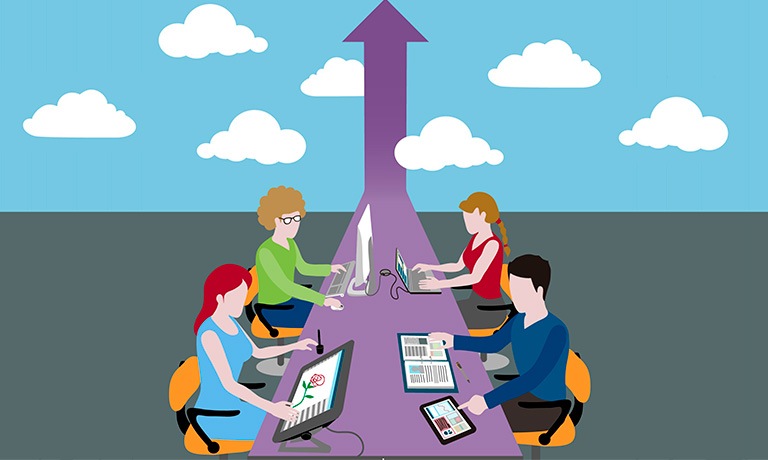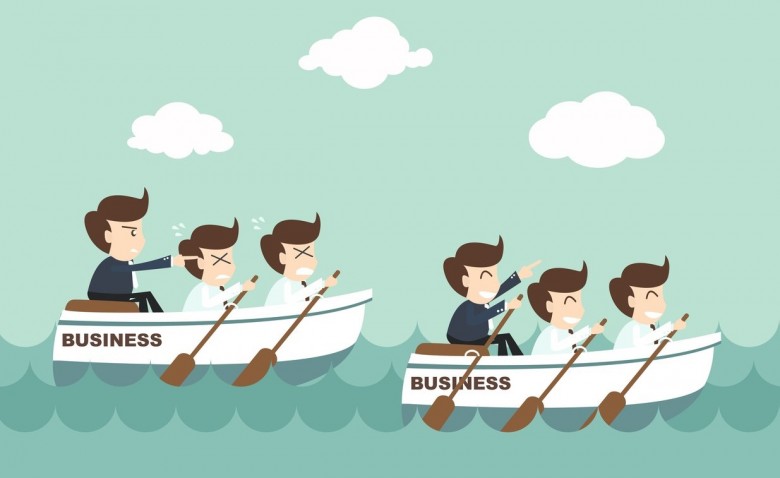For David Bladow, entrepreneurship is the family business.
The co-founder and CEO of flower delivery startup BloomThat grew up surrounded by people who never had their own boss: his grandfather, mother, father and stepfather. That mentality still runs strong. Every day, he carpools to work with his wife Callie, BloomThat’s production director.
The company was launched in San Francisco at Y Combinator in 2013 to improve the experience of flower delivery and “make it easier for people to be more thoughtful.” By 2015, BloomThat had raised $7.6 million in venture capital funding. The company reports that it is profitable, and it provides same-day delivery in Los Angeles, San Francisco and New York, and next day delivery across the country.
But things weren’t always coming up roses. A few years into its run, the company ran into some obstacles and had to rethink its approach, like temporarily shuttering it’s same-day delivery option in Los Angeles, and included a $9.99 delivery fee.
Today, the company reports that it is profitable, and it provides same day delivery in Los Angeles, San Francisco and New York, and next day delivery across the country.
Bladow says that his experience with BloomThat has taught him about accountability, how not to be thrown by the things beyond your control and focus on what you can tackle right in front of you.
We caught up with Bladow for our 20 Questions series to find out what motivates him and makes him tick.
Interview was edited for length and clarity.
1. How do you start your day?
By nature I’m a night person, but I morphed myself into a morning persons because I think it’s more effective. I wake up and chug a full glass of water to make sure I’m hydrated. I try to find 10 to 20 minutes to read and meditate, get an hour of work in before I drink a cup of coffee and walk the dog. Then it is breakfast in the car with my wife as we commute into work and and then it’s into the day.
If I don’t make the time from 6:00 to 9:00 am to do what I need to do and get my mind right, I find that I’m at the mercy of other people’s schedules and demands. This way I put myself on the right track for the day.

2. How do you end your day?
Usually watching a Netflix show to wind down. It’s an easy and cheap form of entertainment. Or I’ll cook dinner with my wife and before bed I’ll try to read for 30 minutes to settle down and hopefully learn a little something.
I used to push it and work 24/7, but I’ve found that’s less effective because giving yourself time to reset is a really important thing.
3. What’s a book that changed your mind?
Meditations by Marcus Aurelius. It’s an adapted book of thoughts from Marcus Aurelius. The premise is that it is all about living in the present, accepting change and having a simple set of principles that guide you through life. The quote I think about a lot is “the value of attentiveness varies in proportion to its object.”
Don’t give the small things the time they don’t deserve. The little things that get under your skin, and you spend all day dwelling on them when you shouldn’t. Focus on the two or three things that you can control in life, the rest you just take in stride.
4. What’s a book you always recommend and why?
Shantaram, a novel by Gregory David Roberts. It is the most incredible fiction novel I’ve ever read. It’s a story about a guy who escaped from prison in Australia and smuggles his way into India. He lives in the slums where he works as a doctor before getting involved with a Bombay mafia lord. It’s 900 pages long, yet the story includes so many crazy adventures and is woven in such an incredible way that you don’t want it to end.
5. What’s a strategy to keep focused?
Before I go to bed on Sunday, I plan out my week for each day, and ask myself what I need to get done each day. At the top of the list, I highlight my three most important tasks for the week. No more than three. These are the thing I have to be focused on. I modify it as the week goes on and I return to that list multiple times a day. If I didn’t have that from the get go, it’s easy to get pulled in different directions. Before the dust gets thrown in the air, it helps keep me focused on what I need to accomplish for the week.
6. When you were a kid what did you want to be when you grew up?
An NBA basketball player. I wanted to be a basketball player and entrepreneur. I’m 5 feet 9 inches tall, but I was better suited for the latter. I always wanted to work for myself, even when I didn’t know what I was going to be –even when I was a little kid. My grandfather, dad, mom and stepdad are all entrepreneurs. I’ve never known anything else, none of them never had bosses. I grew up with that mentality.
7. What did you learn from the worst boss you ever had?
What I’ve learned is not to jump to judgement so quickly. Take more time and think about interactions from the other person’s perspective. It allows you to come in with a more tactful point of view.
8. Who has influenced you most when it comes to how you approach your work and why?
My dad. He taught me the value of tenacity and perseverance. He’s an entrepreneur. I observed firsthand the swings of owning your own business and the ups and downs of owning a business. You have to be smart and work hard, but often it is simply the sticktoitness you need to fight through the darkest days. That’s what makes a difference. Just don’t quit.
And then my wife, who I recruited to work for BloomThat, is a huge inspiration to me because she is a total badass. She has a work ethic and tenacity that is unmatched. I have to match her level. She’s a really unique person.

9. What’s a trip that changed you?
I met my wife studying abroad in Australia in college. I had to go to Australia to find a girl from Tennessee. Through that trip I met her, and we’ve been together for 10 years. One of the first things I said to her, when we started to become friends, was “you’re one of the only people I would go into business with.” It wasn’t a line; it was just what I thought and felt. It was foreshadowing what as to come over the next 10 years.
10. What inspires you and why?
I’m really inspired by Elon Musk. I think he gets people to think bigger and shoot for these outlandish feats that are good for humanity. Having people thinking about ideas that are audacious is a good thing to spur people on. I’m not shooting to land people on Mars, but it’s good for people in general.
And my grandpa. He was from North Dakota, had an eighth grade education and hopped a boxcar to California to make a success out of himself. He started a couple of furniture stores, and at the peak of his career had 10 stores. He was a guy who started with nothing. I always was inspired by his courage.
11. What was your first business idea and what did you do with it?
BloomThat is officially my first real business that I started. However, in fourth grade I would burn CDs and cornered the market on rare imports, like a Tupac CD from Japan, and would re-sell them. It’s illegal. I wouldn’t do that now, but at the time, it felt very fringe. In college I would buy tickets to what I thought would be sold-out shows and then re-sell them on eBay. Those were side things. BloomThat was my first real company.
12. What was an early job that taught you something important or useful that you still use today?
Right out of college, the family business is the restaurant business. From being in the food industry before getting into flowers, I looked at In-n-Out. I admired their model. I took away that you only need to do a few things and do them well. Lesson there is stick with simplicity and execution, and you can get people to line up around the block if you do it at a high level.
13. What’s the best advice you ever took?
There was a period of time where I didn’t have control over things, and I felt bad about the things that were happening. I was talking to one of our investors, and she said “when you stop acting like an asshole, you’ll stop feeling like an asshole.”
Basically when you are ready to take full accountability of things that are going on, you’re going to stop feeling like you’re in a position to feel like an asshole all the time. It stuck with me because it was basically control the things that you can control.
14. What’s the worst piece of advice you ever got?
When I started Bloomthat a lot of people told me it wasn’t going to work.I think it was well intentioned, but I’m glad I ignored it. Take that kind of advice with a grain of salt and keep pushing.

15. What’s a productivity tip you swear by?
Go to bed and get up early. Don’t let people interrupt you when you’re in your zone. Just say no more often and get comfortable saying no. If you can do those three things you’ll stay on a solid, productive path.
16. Is there an app or tool you use to get things done or stay on track?
I use the Notes app. It syncs between all devices, it’s very simple, I make agendas and it’s all there. The best tool is the one that you use, and for me, that’s my system.
17. What does work-life balance mean to you?
To me it’s having enough time outside your daily work to find center and find joy. If it’s cooking, spending time with my wife or going skiing on a weekend, it is being able to set aside time that’s not work. Being an entrepreneur it’s easy to lose track of that, and you are working harder, but you’re not being productive. It’s addition by subtraction. If you can find that time to relax, you will be more effective with the time you devote to work.
18. How do you prevent burnout?I’ve become stricter on protecting my time, putting hard stops when I have to get out of the office. Every three to four months, I also give myself a weekend away. Make sure you have something that you look forward to.
19. When you’re faced with a creativity block, what’s your strategy to get innovating?
I think movement is key. I walk, but I also move desks a lot. I’m like nomad with where I work; I find that a change in space helps me.
I keep a pen and notebook on me at all times in case the moment strikes. I fill up notebooks. Reading books, I find analogies in other people’s experiences. All it takes is a fragment of an idea to get your brain going again.
20. What are you learning now?
I’m in a meditation program, so I’m learning about mindfulness. The most important thing that an entrepreneur can do is put yourself in a place where your mind is sharp and fresh. Any practice the more you do, the better you get.
Source: Entrepreneur
